Learn the Dos and Don’ts of Supplying Medical Furniture to Healthcare MSMEs Now
Table of Contents
Introduction
Supplying medical furniture items to healthcare MSMEs like small clinics, diagnostic labs, and nursing homes requires more than just selling products.
These buyers operate on tight budgets, limited space, and high patient expectations.
This means suppliers must combine product quality, regulatory compliance, and responsive service to build lasting business relationships.
In this guide, we’ll cover the key dos and don’ts, compliance essentials, after-sales strategies, and pricing adjustments that will help suppliers thrive in this competitive sector.
1. What Are the Key “Dos” for Successfully Supplying Medical Furniture to Healthcare MSMEs?
To become a trusted supplier in the MSME healthcare market, follow these best practices:

- Ensure Strict Quality Checks
- Inspect every batch of medical furniture items before dispatch.
- Test for stability, load-bearing capacity, and finishing quality.
- Inspect every batch of medical furniture items before dispatch.
- Offer Customization
- Adapt designs to fit small clinic spaces, foldable examination tables, modular storage,and compact waiting benches.
- Adapt designs to fit small clinic spaces, foldable examination tables, modular storage,and compact waiting benches.
- Maintain Timely Delivery
- In healthcare, delays can affect patient service. Build a logistics schedule that ensures on-time delivery.
- In healthcare, delays can affect patient service. Build a logistics schedule that ensures on-time delivery.
- Provide Clear Documentation
- Include warranty cards, maintenance guides, and compliance certificates.
- Include warranty cards, maintenance guides, and compliance certificates.
- Educate the Buyer
- Offer setup guidance, maintenance tips, and ergonomic benefits to clinic staff.
- Offer setup guidance, maintenance tips, and ergonomic benefits to clinic staff.
Example: A supplier in Pune secured repeat orders from 12 small dental clinics by offering space-saving, wall-mounted cabinets with custom dimensions delivered within 10 days.
2. What Common Mistakes Should Suppliers Avoid When Selling Medical Furniture to Clinics and Labs?
Avoiding common pitfalls can save your reputation and client relationships:
- Poor After-Sales Service – Ignoring repair requests or delays in spare parts supply leads to churn.
- Overpricing Without Justification – MSMEs will compare multiple vendors; premium pricing needs a visible value.
- Wrong Sizing – Supplying oversized examination tables to a 100 sq. ft. consultation room can disrupt workflow.
- Ignoring Ergonomics – Chairs without lumbar support or improper table height can cause staff discomfort.
- Generic Packaging – Failing to protect items during transport increases damage claims.
Pro Tip: Conduct a site visit before confirming large furniture orders to assess space constraints and avoid costly returns.
3. How Can Suppliers Ensure Compliance With Healthcare Safety and Quality Standards for Medical Furniture?
Compliance is a non-negotiable part of supplying medical furniture items to healthcare facilities.
- Material Standards
- Use stainless steel (SS 304 grade) for surgical and wet areas.
- Ensure powder-coated finishes for durability and hygiene.
- Use stainless steel (SS 304 grade) for surgical and wet areas.
- Certifications & Regulations
- Follow BIS (Bureau of Indian Standards) guidelines for load capacity and safety.
- For hospital beds and similar items, comply with ISO 13485 standards.
- Follow BIS (Bureau of Indian Standards) guidelines for load capacity and safety.
- Hygiene and Sanitization
- Ensure surfaces are non-porous and easy to disinfect.
- Avoid materials prone to rust or mold.
- Ensure surfaces are non-porous and easy to disinfect.
- Documentation
- Provide compliance certificates and testing reports with each delivery.
- Provide compliance certificates and testing reports with each delivery.
Example: A Karnataka-based supplier increased sales by 40% after marketing their products as “ISO 13485-certified” in addition to regular quality checks.
4. What Role Does After-Sales Support Play in Retaining Healthcare MSME Clients for Medical Furniture?
After-sales service is the backbone of long-term supplier-client relationships.
- Maintenance Contracts – Offer AMC (Annual Maintenance Contracts) for beds, chairs, and trolleys.
- Warranty Fulfillment – Respond quickly to replacement or repair claims.
- Training for Staff – Show clinic staff how to assemble, clean, and maintain items.
- Spare Parts Availability – Keep essential parts like wheels, levers, or screws in stock for quick fixes.
Why it matters:
Healthcare MSMEs often rely on the same supplier for years if the service is prompt.
A single fast repair can be the reason for repeat bulk orders.
5. How Can Suppliers Adapt Pricing, Packaging, and Delivery to Suit Small Clinic Budgets and Space Constraints?
Healthcare MSMEs, especially in Tier 2 and Tier 3 cities, need suppliers who understand their realities.
Pricing Adaptations:
- Offer tiered pricing for bulk vs. single-item purchases.
- Provide installment-based payment plans for high-ticket items like hydraulic examination tables.
Packaging Solutions:
- Use modular or knock-down packaging to reduce transport costs.
- Provide protective wrapping to prevent transit damage.
Delivery Adjustments:
- Schedule deliveries at off-peak clinic hours to avoid disruptions.
- Offer partial deliveries for phased clinic setups.
Example: A supplier in Indore doubled sales by introducing “ready-to-assemble” instrument trolleys that cut shipping costs by 25% and made it easier for small clinics to store before setup.
Conclusion
Supplying medical furniture items to healthcare MSMEs is a relationship-driven business.
By following best practices like quality control, customization, and reliable after-sales service while avoiding pitfalls like poor sizing and non-compliance, you can position yourself as a trusted partner rather than just a vendor.
Tailoring your pricing, packaging, and delivery strategies to MSME needs ensures not only immediate sales but also steady repeat business.
Frequently Asked Questions (FAQ)
Q1: What’s the biggest factor in winning MSME medical furniture contracts?
A: Consistent quality and timely delivery.
Q2: How do I ensure my products meet healthcare standards?
A: Use certified materials, follow BIS/ISO guidelines, and provide compliance documentation.
Q3: Should I offer credit terms to small clinics?
A: Offer short-term credit only to verified clients with a good payment history.
Q4: How can I reduce delivery damages?
A: Use modular packaging, protective wraps, and reliable logistics partners.
Q5: Is customization worth the extra effort?
A: Yes, especially for small clinics with unique space constraints—it increases loyalty and referrals.
Also Read,
- The Ultimate Guide: Working Capital Loans for Small Business (MSMEs) in 2025
Understanding the Impact of Payment Terms on Working Capital for Clinics
How Poor Inventory Management Hurts Working Capital in Pharmacies.
Want a Better Business Credit Score? Small Pharmacies Can Now Use UPI & Cards to Build It
Want a Better Credit Score? Use Small Daily Payments to Build Your CBIL (For Clinics & Pharmacies)
Case Study:How a Small Clinic Improved Its Working Capital Management





